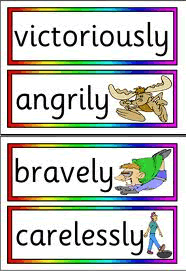Adverbs and how to use them English lesson
What will I learn from the English lesson adverbs and how to use them?
During this lesson you will learn what adverbs are and why they are different to verbs.
What are adverbs?
Adverbs modify verbs, adjectives, other adverbs or prepositions.
They tell you how, why, when, where, etc.
How to create an adverb
You can form an adverb by adding "ly" to an adjective. the words that are black are verbs and the words in red have been altered to make an adverb.
loud loudly recent recently
quick quickly happy happily
When I arrived at their house, the big dog, which was called Rover, was barking loudly because it was lonely.
Changing the position of adverbs in a sentence
When adverbs modify verbs they can often move about in the sentence, varying its rhythm and emphasis.
In this sentence, the adverb originally can be inserted at any of the points that are marked ^.
^ The book ^ must ^ have ^ been ^ bought ^ in this shop ^.
originally The book originally must originally have originally been originally bought originally in this shop originally.
Adverbs of manner, place and time, reason and degree
Adverbs are defined by the question they answer.
manner adverbs - answer the question 'How?'
slowly quickly carefully fast well anxiously heavily
Q. 'How did he run?'
A. 'Slowly'
The boy nibbled carefully at his apple.
place adverbs - answer the question 'Where?'
outside inside home away here there everywhere
Q. Where was the traffic bad?
A. Everywhere
Outside the temperature was freezing.
time adverbs - answer the question 'When / how often?'
now, then, next, soon, always, often, frequently
Q When is it my turn?
A. Next.
Q. How often do you see your father?
A. Frequently.
It seldom rains in the desert.
I'm going now.
reason adverbs - answer the question 'Why?'
therefore, consequently, so (Is so an adverb or conjunction?)
He misread the map and consequently became very lost.
The dog barked so I ran for it.
degree adverbs - answer the question 'How much?'
very, a bit, sufficiently, enough
Q. How difficult was the exam?
A. Very (difficult).
It was windy enough for them to fly their kite.
More adverbs:
sideways northward clockwise
outwards soon often
very quite rather
extremely easily well
badly energetically basically
publicly
"So" – adverb or conjunction?
So is on the borderline between adverbs and conjunctions.
Like the co-ordinating conjunctions and and or, it often links two clauses.
In this sentence so could be described as either an adverb or a conjunction:
The dog barked so I ran for it.
But in the next sentence so is more clearly an adverb because there is already a conjunction (and) linking the clauses. Here, so is an adverb expressing reason:
The dog barked and so I ran for it.
Easy pace Learning online dictionary and how to use dictionaries
Click on the following link for the Online English dictionary - English lesson
